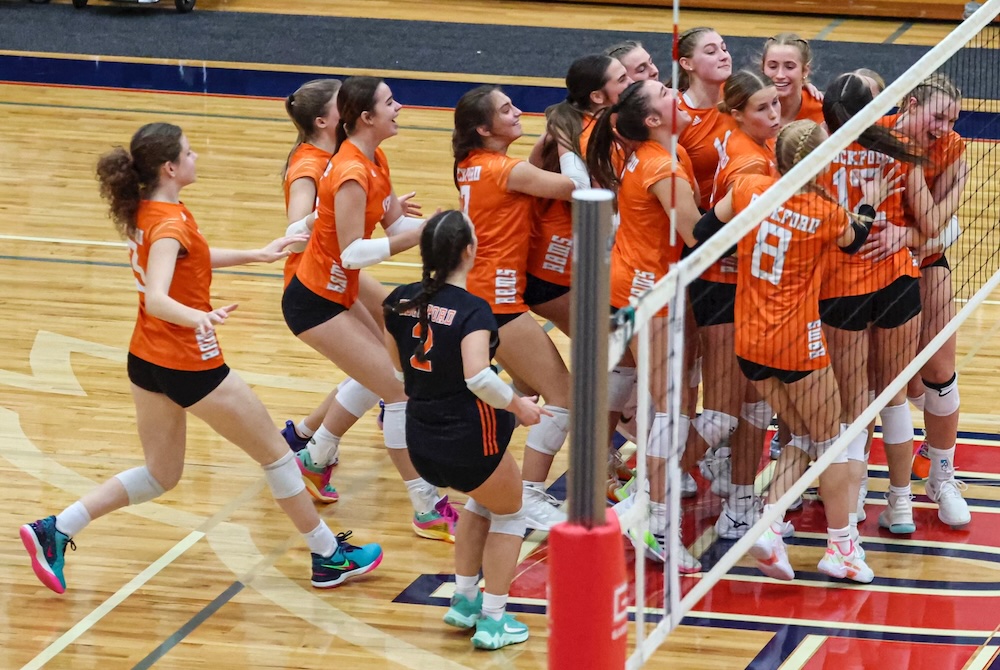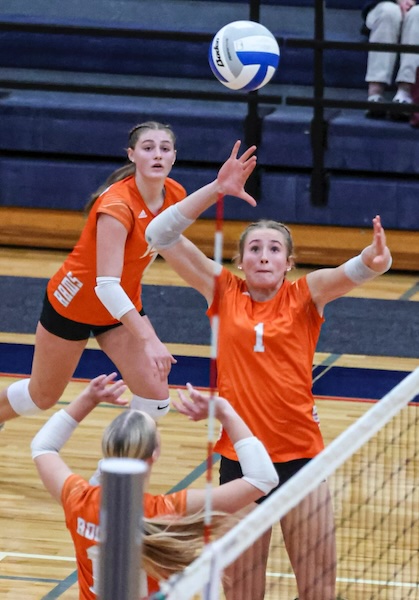
Casting Lines for Future Tournaments
August 12, 2016
By Jack Roberts
MHSAA Executive Director
The MHSAA is best known to the public for the tournaments it conducts to conclude the fall, winter and spring seasons each school year.
These tournaments, the first and largest program of the MHSAA, have survived the Vietnam War, the Korean conflict and two World Wars. They have survived the technology bubble, the housing collapse, the energy crisis and the Great Depression.
MHSAA tournaments existed at the dawn of aviation and at the time of our nation’s lunar landing. Popes, presidents and governors have changed and changed again and again, and MHSAA tournaments roll on year after year.
But the sense of tradition and permanence and inevitability of MHSAA tournaments doesn’t dissuade us from asking questions about our tournaments, even some of the most basic questions. Here are two.
Question #1
I have long been and will always be an advocate for a Ryder Cup format for the MHSAA Golf Finals, and a team tennis approach to the MHSAA Tennis Finals; but 90 years of tradition is hard to overcome. Might this be a more exciting format? Could it be co-ed? Could it reverse the decline in boys tennis participation, and increase girls golf participation? Wouldn’t it be fun to try?
Periodically, the International Olympic Committee requires each of the designated Olympic sports to defend its status, to state its case why the sport should remain a part of the Olympic program. Then, after a series or votes that retain one sport at a time, the IOC drops the sport that makes the weakest case. It does so to make room for one of the previously unlisted sports that makes the best case for inclusion.
This would appear to keep the existing Olympic sports on their toes, and to keep the Olympic movement fresh and reflective of modern trends in sports.
While I would not enjoy the controversy, I can see the potential for some positive results if the MHSAA were to invoke the same policy for determining the 14 tournaments it will provide for girls and the 14 for boys.
This might cause us to consider more deeply what a high school sport should look like, or at least what an MHSAA tournament sport should stand for.
On the one hand, we might be inclined to drop tournaments for those sports that involve mostly non-faculty coaches and non-school venues, or require cooperative programs to generate enough participants to support a team, or resort almost entirely to non-school funding, or cater to individuals more than teams.
Or perhaps this process would cause policymakers to forget traditional thinking and ask: “In this day and age, should we shake off traditional notions of sport and consider more where modern kids are coming from?” That might mean fewer team sports and more individual sports, more “extreme” sports like snowboarding and skateboarding, and more lifetime sports, meaning not just golf and tennis and running sports, but also fishing and even shooting sports.
Currently, MHSAA policy states that the MHSAA will consider sponsorship of a tournament series for any sport which 64 member schools conduct on an interscholastic basis as a result of action by the governing boards of those schools.
Should the only question be how many schools sponsor a sport, or must an activity also have certain qualities and/or avoid certain “defects?” What should an MHSAA tournament sport look like and stand for?
Question #2
Bristling from criticism that his association is a money-grabbing exploiter of children, my counterpart in another state said, “If we were running our programs just to make money, we would do very many things very differently.” I knew exactly what he meant.
Because we care about the health and welfare of students, because we mean what we say that the athletic program needs to maximize the ways it enhances the school experience while minimizing academic conflicts, and because we try to model our claim that no sport is a minor sport when it comes to its potential to teach young people life lessons, we operate our programs in ways that make promoters, marketers and business entrepreneurs laugh, cry or cringe.
If money were the only object, we would seed and select sites to assure the teams that attracted the most spectators had the best chance to advance in our tournaments, regardless of the travel for any team or its fan base. If money were the only object, we would never schedule two tournaments to overlap and compete for public attention, much less tolerate three or four overlapping events. If money were the only object, we would allow signage like NASCAR events and promotions like minor league baseball games.
Those approaches to event sponsorship may not be all wrong; they’re just not all right for us. And we will live with the consequences of our belief system.
During a typical school year, more than 20 percent of the MHSAA’s 2,097 District, Regional and Final tournaments lose money. Not a single site in golf, skiing or tennis makes a single penny. In no sport did every District, Regional and Final site have revenue in excess of direct expenses.
In fact, in only three sports – boys and girls basketball and football – is revenue so much greater than direct expenses overall that it helps to pay for all the other tournaments in which the MHSAA invests.
That’s right: invests. When we present our budget to our board, we talk about the MHSAA’s investment in providing tournament opportunities in all those sports and all those places that cannot sustain the cost of those events on their own. How much is this investment worth to students, schools and society?
These two are core questions that require our focus far in advance of talk about scheduling, site selection, seeding and the myriad matters that too often hijack our time and attention.

Visser Relishing Rockford Run In Return After Missed Season
By
Dean Holzwarth
Special for MHSAA.com
November 20, 2024
ROCKFORD – The Rockford volleyball team is in the midst of an impressive postseason run, and just two wins away from a Division 1 championship.
 Senior Layla Visser is beyond grateful for the opportunity to be a part of it after an injury derailed her junior season.
Senior Layla Visser is beyond grateful for the opportunity to be a part of it after an injury derailed her junior season.
Visser missed it entirely after having shoulder surgery. She didn’t return to the court until midway through this fall, but has been a major contributor in the team’s success as the Rams enter Thursday’s Division 1 Semifinal against Fenton (30-2) at Battle Creek’s Kellogg Arena.
“It’s amazing to be back,” Visser said. “I love volleyball more now than I ever have.”
Visser started feeling pain in her right shoulder following her sophomore season. Doctors discovered that she had a torn labrum, rotator cuff and biceps tendon.
Being away from the sport she loves took its toll.
“It was a lot harder than I expected it to be, but it really pushed me,” Visser said. “It was really emotionally and mentally hard, unlike anything I’ve ever been through because volleyball is my passion and my identity. So not being able to play or be a part of that was hard.
“All of these girls are really special to me, and I’ve been playing with them for a long time now. To finally be able to be on the court again with them and playing at a high level feels really good and special.”
Rockford junior Liv Hosford is thrilled to have her friend and teammate back on the court, helping the Rams in their pursuit of the program’s first Finals title since 2011.
“It’s definitely huge to have her back, and even when she wasn't playing she was a huge part of our team with her positivity on the bench and keeping the energy up and giving us extra motivation sometimes when we didn't have any,” Hosford said. “She’s been a huge part of our team and our success with her wall of a block, and her hits are becoming so good.”
 Rams coach Kelly Delacher said Visser has been a welcome addition to a team abounding with veteran experience and young talent.
Rams coach Kelly Delacher said Visser has been a welcome addition to a team abounding with veteran experience and young talent.
“She didn’t play at all last year and the first month of this season, so it was incredible to get her back,” he said. “We converted her to a middle hitter, which she has never played before, but she has been great as far as leadership and blocking and giving us some offense out of the middle.”
Rockford (39-9), which has dropped only two sets during the MHSAA Tournament, swept Traverse City Central 3-0 in a Division 1 Quarterfinal.
A grueling and lengthy third set saw the Rams prevail, 36-34.
“That was the longest single set I’ve been a part of, but they were a very solid team with some scary hitters and our kids came out and were focused from point one,” Delacher said. “We did a good job of exploiting a couple of matchups, and our outside hitter Mallory Wandel had a big night with 27 kills.”
Depth and talent, combined with a tight-knit bond, have been staples for the Rams.
“I knew right from the beginning that we had something special,” Delacher said. “We had a great mix of seniors with some young talented players, and I give a lot of credit to our captains and our seniors for creating a great chemistry and bond where they are not worried about their individual goals. They just want to win and support each other in the process.”
Hosford echoed those sentiments:
“One of the biggest things is our team chemistry,” she said. “I feel like we are a big family, and we’ve clicked from the first practice and we've continued to build that. We just have so much trust in each other, and we are all working toward the same goal.
The Rams, who won the Ottawa-Kent Conference Red title this year, have appeared in the Finals twice since that championship run in 2011. They were Division 1 runners-up in 2018 after a loss to Lake Orion, and Class A runner-up in 2016 after falling to Novi.
“There are very good teams left in Fenton, which has had a great season with only a couple of losses, and Northville and Marian on the other side of the bracket are very good teams,” Delacher said. “It’s going to take us playing our best volleyball, and I believe our kids our starting to believe that. We’ve matched up against four straight ranked opponents, and we’ve played pretty well so I feel like our confidence is pretty high. We feel like we have as good a chance as anybody.”
 Dean Holzwarth has covered primarily high school sports for Grand Rapids-based WOOD-TV for five years after serving at the Grand Rapids Press and MLive for 16 years along with shorter stints at the Ionia Sentinel and WZZM. Contact him at [email protected] with story ideas for Allegan, Kent and Ottawa counties.
Dean Holzwarth has covered primarily high school sports for Grand Rapids-based WOOD-TV for five years after serving at the Grand Rapids Press and MLive for 16 years along with shorter stints at the Ionia Sentinel and WZZM. Contact him at [email protected] with story ideas for Allegan, Kent and Ottawa counties.
PHOTOS (Top) Rockford celebrates its Quarterfinal win over Traverse City Central on Tuesday at Big Rapids High School. (Middle) Layla Visser (1) winds up for a kill attempt with Izzie Delacher setting and Liz Hosford (14) also approaching the net. (Photos by Miles Postema.)

